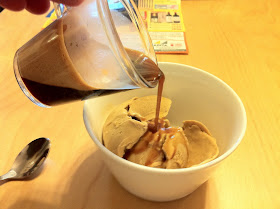If you have a sweet tooth like me, ice cream machine is one of those irreplaceable kitchen gadgets, and it's surprisingly easy to make. Of course you can follow one of the many recipes you can find online, but after a while, you can easily live without following anyone and just start create your own formula.
To me, one of the keys for a yummy ice cream is to get the cream-milk-sugar proportion right - the rest are just minor details. What I usually do is roughly 1.5 cup of whipping cream, 0.5 cup of milk, and 0.5 cup of sugar. Of course you don't have to follow this by the book - say if you are making honey ice cream, you would probably need to reduce your sugar. For eggs, I usually do 2-3 egg yolks and I tend to use less for lighter flavors (like that of fruit-based ones) and more for stronger ones. Feel free to play around the cream-milk ratio too to alter the taste and texture, but if I were you I wouldn't go less than half cream and half milk.
Some people swore that one "secret" critical success factor for a creamy ice cream is a dash of salt to the custard before churning. If I remember I usually follow that, but to be honest, I saw little difference even if I forgot. I know as a fact that salt does keep the ice cream from getting too frozen - something I have learnt when I made salty caramel ice cream, but I am just not sure how much a pinch of salt would have helped to that effect.
Anyway, to make long story short, here's what I usually do: I will start beating sugar and egg yolks together in a bowl, while heating up the cream and milk in the pan. Just before bubbles starting to form in the cream-milk mixture, I pull the pan off the stove and pour it into the sugar and egg yolks, which should form a thick pale mixture. Do it slowly (in a steady stream) to avoid egg yolks from getting cooked and curdled up. Give the mixture a good whip before putting it back to the pan to steep the custard further over low heat. I usually do it for a good 10 minutes until the custard start coating on the wooden spoon (probably takes longer if you use more milk) Then sieve it through into a bowl and chill for about 2 hours (up to a day).
After that the rest are easy, pull the chilled custard out, stir it with a spoon and then pour into the ice cream machine. Do what your ice cream maker instruction told you and then put the frozen custard in an airtight container, and in about 3 hours, your ice cream's ready to serve.
Okay, I forgot the part when you need to add the flavors. Well if you are doing a fresh vanilla, put the scrapped pod into the warm custard before it's reheated. Discard the pod before you chill. Same with coffee or tea - you want to give the custard time to take in the flavors in heat. If you do vanilla extract - which I admit I would sometimes do - you can put that in any time you want - it wouldn't make a difference. If you do fruit flavors, puree whatever fruit you are doing and mix that in before you chill your custard. Nuts and other tidbits must be put in just before your ice cream maker stopped churning, so is any alcohol you want to add in.
Hope I didn't miss any step. And I am leaving you with the latest one I have made: affogato with espresso ice cream. (the kind of dessert I would want for every lunch so as to get me through the rest of the day) Enjoy!






No comments :
Post a Comment